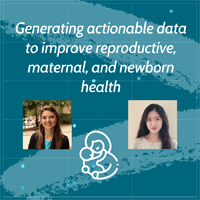PMA Ethiopia: Generating actionable data to improve reproductive, maternal, and newborn health

![]()
By: Ellie Qian and Sally Safi
This blog was originally published on the PMA Ethiopia website.
This is the first of a series of blog posts that share “behind the scenes” insights into a survey project in Ethiopia — Performance Monitoring for Action Ethiopia (PMA Ethiopia). In this blog, we will take you from data collection updates in communities to results of our policy-changing research. If you are interested in global health, digital health, or reproductive, maternal, and newborn health research and programs, this blog is for you.

PMA resident enumerators on the way to collect data in a village near Addis Ababa
Ethiopia is one of the most populous countries in the world with 112 million residents, about three-quarters of whom live in rural areas. Understanding peoples’ access to and use of life-saving health care services, such as newborn care practices and family planning, is essential for addressing health needs and empowering Ethiopians to lead healthy, fulfilling lives.
To generate comprehensive, accurate, and up-to-date data on such a large, culturally and geographically diverse population, Performance Monitoring for Action Ethiopia (PMA Ethiopia) conducts surveys focused on reproductive, maternal, and newborn health (RMNH). The project is a collaborative effort between Addis Ababa University (AAU), Johns Hopkins University (JHU), and the Ethiopia Federal Ministry of Health (FMOH). PMA Ethiopia surveys transform on-the-ground conversations with Ethiopian women and healthcare workers into data that are used by policy makers, program managers, and other curious minds (like yours!) to take evidence-based action to improve the health of women and children across the country.
What is PMA Ethiopia?
PMA Ethiopia surveys and their unique contribution to public health
PMA Ethiopia conducts three types of surveys. The first is an annual “snapshot” survey that focuses on reproductive health. In this cross-sectional survey, we ask women of childbearing age (ages 15 to 49) about topics such as current and past family planning use, fertility intentions, and relationship dynamics. The second survey follows pregnant women through one year postpartum to gather data on their health and care-seeking behaviors before, during, and after childbirth. The third survey collects data from health facilities, such as pharmacies, health centers, and hospitals, to assess how equipped facilities are to provide essential RMNH services.
PMA Ethiopia is unique due to its adaptable and innovative design. When the COVID-19 pandemic began in the spring of 2020, the project immediately integrated questions into surveys about people’s knowledge of COVID-19 and the impact the virus and its restrictions had on access to health care.
PMA Ethiopia also provides data not gathered by other national surveys, including new measures of reproductive coercion, quality of care, and data linking women’s health outcomes and their surrounding health services.
Below are just a few of the important insights we have learned so far:
- One in four women (26%) are using a method of modern contraception, and the share of women using long-acting methods, such as implants, has increased substantially over the past several years. At the same time, PMA Ethiopia has found that the quality of contraceptive counseling has gone down over time.
- One in five women in Ethiopia experienced reproductive coercion from their husband or partner during the past year. The most severe forms of reproductive coercion are linked to 40% reduction in contraceptive use.
- About half of pregnant women (55%) deliver in a health facility. While women living in rural areas are much more likely to deliver at home than urban women, urban women were more likely to report that COVID-19 affected where they delivered.
- Approximately one in ten women experienced intimate partner violence during their most recent pregnancy, with increases in prevalence observed after COVID-19.
- Roughly one-quarter (26%) of women who delivered at a public health facility were counseled on postpartum family planning before they were discharged.
- Nearly all health centers (98%) are able to remove standard (palpable) implants, but only half (54.5%) are able to remove non-palpable implants.
- Several priority medicines for maternal and newborn care, including injectable calcium gluconate, cefixime, methyldopa, mifepristone, and misoprostol, are readily available in less than half of health centers and health clinics surveyed.
We will share these results in the coming weeks and months.
How does it work?
PMA Ethiopia survey design
The foundation of the PMA Ethiopia project rests upon the work of over 200 dedicated interviewers — whom we refer to as “resident enumerators”. After completing training from PMA Ethiopia, the resident enumerators conduct in-person surveys of households, women, and health facilities with the support of dedicated survey team supervisors. Interviewers ask women questions from a set of questionnaires that have been designed with input from the FMOH, enter respondent answers into their smartphones, and send the data to AAU and JHU for analysis.
PMA Ethiopia uses a set of statistical strategies to identify women and health facilities to interview. In a nutshell, the sampling process begins by randomly selecting a set of small geographic areas, or neighborhoods with about 200 households (also called “enumeration areas”), from each region in Ethiopia. Within those enumeration areas, interviewers list all households and identify currently pregnant residents. Interviewers survey those pregnant women as well as other women from a randomly-selected sample of 35 households. This selection process results in a group of survey participants whose experiences are reflective of the experiences of Ethiopia’s population as a whole. In the facility-based survey, which complements women’s experiences, selected health facilities provide valuable data on the health service delivery environment in the population they are serving.
Beyond collecting data, PMA Ethiopia invests in the technical skills and expertise of Ethiopian partners to promote their ownership of the survey platform. The project also provides training and mentorship to Ethiopian researchers to enable them to conduct and publish studies using PMA Ethiopia data in collaboration with faculty at JHU. Be on the lookout for highlights of research coming down the pipeline on this blog!
What does this mean for you?
Accessibility of the PMA platform
Anyone can use PMA Ethiopia data; it is easily accessible. On the PMA website you can view technical reports and briefs that summarize survey findings, download full datasets to conduct your own analyses, and use an interactive tool, DataLab, to visualize estimates and trends in reproductive health. We encourage you to explore the website and learn about reproductive, maternal, and newborn health in Ethiopia.
ABOUT THE AUTHORS
 Ellie Qian, MSPH, supports data analysis, research, data product development, and communication activities for PMA Ethiopia. Ellie holds a Master of Science in Public Health from the Department of Population, Family and Reproductive Health at the Johns Hopkins Bloomberg School of Public Health. Prior to joining PMA, she honed her analytic and evidence translation skills through research projects focused on improving maternal and newborn health both domestically and globally. Ellie received her bachelor’s degree in Public Health from the University of Washington.
Ellie Qian, MSPH, supports data analysis, research, data product development, and communication activities for PMA Ethiopia. Ellie holds a Master of Science in Public Health from the Department of Population, Family and Reproductive Health at the Johns Hopkins Bloomberg School of Public Health. Prior to joining PMA, she honed her analytic and evidence translation skills through research projects focused on improving maternal and newborn health both domestically and globally. Ellie received her bachelor’s degree in Public Health from the University of Washington.
 Sally A. Safi, PhD, received her PhD from the Department of Population, Family and Reproductive Health at the Johns Hopkins Bloomberg School of Public Health with a concentration in Reproductive, Perinatal and Women’s Health as well as Health Services Research and Evaluation. Her dissertation research focused on survey methodology and examined the effects of employing resident enumerators and conducting rapid-repeat surveys on data quality. Sally is interested in survey implementation and has experience in survey data collection, management, analysis, and utilization. Currently, Sally leads capacity strengthening activities for the PMA Ethiopia project. In this role Sally is able to combine her interest in survey methodology with the joy of teaching. By working to develop survey research talent and improve data collection systems, Sally aims to help inform public health efforts that ultimately improve access to health services. Sally is a Returned Peace Corps Volunteer (Rwanda 2010 – 2012).
Sally A. Safi, PhD, received her PhD from the Department of Population, Family and Reproductive Health at the Johns Hopkins Bloomberg School of Public Health with a concentration in Reproductive, Perinatal and Women’s Health as well as Health Services Research and Evaluation. Her dissertation research focused on survey methodology and examined the effects of employing resident enumerators and conducting rapid-repeat surveys on data quality. Sally is interested in survey implementation and has experience in survey data collection, management, analysis, and utilization. Currently, Sally leads capacity strengthening activities for the PMA Ethiopia project. In this role Sally is able to combine her interest in survey methodology with the joy of teaching. By working to develop survey research talent and improve data collection systems, Sally aims to help inform public health efforts that ultimately improve access to health services. Sally is a Returned Peace Corps Volunteer (Rwanda 2010 – 2012).




Responses